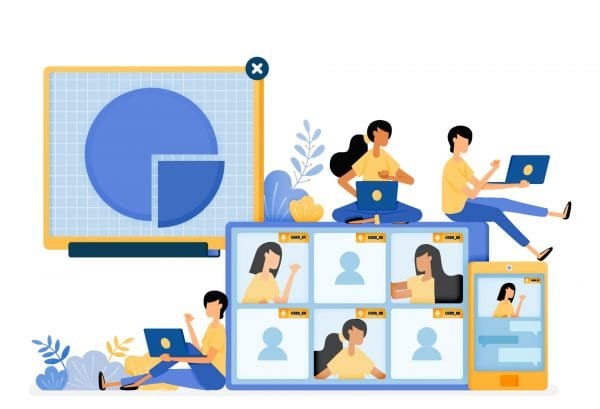The customer service career path is highly lucrative and fulfilling since hardly any industry doesn’t deal with customers now and then.
Since the customer is the reason why most businesses exist, how we relate with them should take the most importance. This is why most companies seek to hire highly professional and skilled personnel to fill the customer service representative position.
To determine whether a customer service career path is for you, discover the requirements to be a customer service professional, the possible salaries, and career paths in this blog post.
12 Best Customer Service Software and Steps to Choose
What Is Customer Service?

Customer service is a business domain that involves providing solutions, support, and personal interaction to people or individuals who patronize a business or company. It involves any client-facing position that offers support by answering questions, solving problems, or handling orders of customers or prospects. Customer service is a vital part of a business’s retention strategy, and it is used to assist customers before, during, and after the purchase of a product or service.
If you work as a customer service representative, you’ll be a liaison between the business and the customer, and it will be your job to reflect the values and culture of the business. A positive customer experience can heavily influence their buying decisions in the present and future, which is why most businesses try to personalize their customer experience to attract business and establish loyalty from their customer base.
What Are the Steps Required for Customer Service Jobs?
1. Education
At the basics, many customer service jobs will require one to have a high school certificate or GED. But for you to have more chances of being selected, a bachelor’s or master’s degree will be required. A bachelor’s degree in communication and language art, psychology, English language, etc. would be an added advantage. Also, a master’s degree in business administration or business management will be an advantage.
2. Acquire Some Skills
Since customer service jobs require you to communicate with customers and answer or solve their complaints, communication, listening, and problem-solving skills are skills you need to master if you want to work in the customer relations department. Other skills you need to add to the above skills include multi-tasking, time management, digital skills, and vast knowledge about the company’s industry. prioritizing and effectively managing their time.
3. Obtain Professional Certification or Licenses
Professional certifications are very important because they allow you to demonstrate mastery of the skills essential for customer service representatives. Although professional certification might not be required in some cases, it can give you an edge over other job candidates.
Some certifications you can acquire include;
- National Customer Service Association’s
- Certified Customer Service Professional credential,
- Customer Service Institute of America’s Certified Customer Experience Professional designation, and HDI’s
Furthermore, you can also take courses on customer relations on Coursera, Alyson, and Udemy for more knowledge and certification online. Note that if you work as a customer representative in the financial services or insurance sector, you may need to obtain a license. Your employer may offer training for these exams in some cases.
4. Gain Experience Through Internships or Entry-Level Job
An internship is a way to acquire industry-based knowledge and experience at the same time. However, most customer service representatives are trained on the job. Since you are representing a company or business, most of the training often will cover products or services, questions customers commonly ask, and the systems you will need to use for your job, like telephones and computers.
6 Most Important Customer Service Skills
What Are the Skills Required for Customer Service Jobs?
Customer service jobs require you to have a lot of skills and experience, including a vast knowledge of the company you’re working for. Examples of skills that can help you in a customer service role include;
Communication Skills
You need to be able to communicate effectively with customers, whether it’s over the phone or in person. If you’re not very good at this and don’t have any experience working in customer service, then you may have trouble getting hired.
Customer Empathy
You must be able to relate to your customers on some level so you can understand how they feel about their issues and problems.
Problem-solving
You’ll need to know how to solve problems when they come up for your company to grow and succeed. This can range from simple things like helping a customer fix a problem with their computer program or explaining why something won’t work correctly so they can figure out a solution themselves
Listening Skills
are an important aspect of customer service jobs because you must understand what customers need and what their expectations are before assisting. You’ll also need good listening skills if you’re going to succeed in this type of position because it requires that you take notes while speaking with customers over the phone or in face-to-face meetings with clients or business partners
Technical Skills
Customer service agents must be able to use computers effectively when completing their job tasks and interacting with customers over email or phone calls. They will also be required to have some technical knowledge about the products or services they are selling, such as how they work or how much it costs for someone else to repair them.
Organizational Skills
Organizing your thoughts and ideas is one of the most important skills for a customer service job. Customer service agents need to be able to prioritize tasks, set deadlines, and manage their time effectively.
Time Management
Customer service agents are often required to work long hours to meet tight deadlines. Customer service agent needs strong time management skills so that they can stay on top of their workload, while also taking time out for personal development and relaxation
Customer Service Career Path
1. Customer Service Representative
Customer Service Representatives (CSRs) are the front line of a business. They help customers with their questions and problems, and they make sure everything is running smoothly. Customer Service Representatives are also responsible for making sure that customer orders are filled properly and on time.
Customer service representatives are required to provide efficient and effective services to their customers, which are expected to deliver satisfactory results in terms of satisfaction, loyalty, and appreciation among potential customers. These qualities would help them in maintaining a competitive position in the market.
Responsibilities
- Respond to calls from customers on the phone.
- Answer emails and other forms of communication with customers.
- Organize and maintain records relating to customer inquiries and/or orders.
- Answer general questions about products or services offered by the business or its employees.
- Keep track of complaints and warranty claims regarding faulty products or services provided by the business or its employees.
- Represent the brand in every interaction
- Deliver best-in-class service with professionalism and empathy
- Keeping records of customer data, including names, addresses, contact information, and account information
- Administering employee benefits packages
- Providing training for new employees
Average Salary
Read More: Android Developer Career Path
2. Customer Service Manager
A customer service manager is responsible for providing quality service to customers and reducing costs. Customer service managers are often employed by companies that are catering to the consumer market, such as restaurants or hotels. A customer service manager’s job duties vary depending on the company they work for and their specific responsibilities. The position of customer service manager can be found in most industries, including retail, banking, insurance, and education.
Responsibilities
Customer service managers are responsible for the management and administration of all aspects of customer service. They oversee the operations of a company in customer service. Their duties include:
• Establishing policies and procedures for customer service, including strategic direction and objectives
• Ensuring that these are implemented across all levels of the organization
• Coordinating with other departments so that they work together on customer service initiatives
• Managing customer complaints, disputes, and issues
• Providing training to employees on how to deal with customers in the most effective manner
Read More: Remote Virtual Assistant Career Path: Everything You Need to Know
3. The Customer Success Manager
They are responsible for the overall success of customer relationships, including sales and customer retention efforts. Customer Success Managers are often involved in the entire process of fulfilling a customer’s order, from order placement to fulfillment, and are responsible for ensuring that the entire customer experience is positive. They also work with the sales team to ensure that all customers have a positive experience with their product or service.
Responsibilities
- The CSM is responsible for ensuring that all customers are treated professionally, given clear directions, and provided with helpful resources.
- Prioritize tasks, manage budgets and schedules
- Communicate effectively with internal teams as well as external partners
- Onboard and train new support team members.
- Prepare performance reports by collecting and analyzing data from customer service functions.
- Responsible for building out success teams, defining success metrics, creating roadmaps, reviewing KPIs, and reporting on how these metrics are being measured.
Read More: How To Succeed As A Remote Social Media Manager
4. Customer Service Manager
A customer service manager leads a customer service team which can sometimes include both the success and the support teams. They are responsible for all aspects of customer service and providing a positive experience for customers. They manage the relationship with customers, analyzing data and making decisions on how to improve the business.
Responsibilities
- Identify, communicate and execute customer needs.
- Improve customer satisfaction by providing excellent customer service.
- Manage the resources needed to deliver great customer service.
- Maintain open communication with all levels of employees to maintain high levels of performance.
- Analyze statistics and compile accurate reports
- Know your business and its products or services inside out
- Give accurate information on products and services to customers
Related: Remote Freelance Project Manager Career Path in 2023
5. Product Support Specialist
Product support specialists are people who have a very detailed knowledge of the product or services offered by a company. Their job is quite different from a customer service representative. While a representative can answer basic questions about orders or complaints, a product support specialist knows more about how the product works and can answer more complicated questions, troubleshoot problems, and serve as an educational resource on product functionality.
Responsibilities
- Provide expert knowledge on customer product issues
- Explain new product updates and features to customers
- Share customer feedback with the product team
- Support customer representative team
- Support contact centre agents in resolving product-related service requests
Related: Career Path for Digital Strategist 101: Everything You Need to Know to Get Started.
Conclusion
So that brings us to the end of this post, and if you’re interested in a career in customer service, hopefully, I’ve given you some information to help your decision. Customer service is a great industry to go into. The pay is good, and with a little effort, you can get the job done while working from home.
If a business, technology, or design isn’t your thing, then perhaps a customer service career path might be a good choice for you. Even if it’s not your first choice career, it can be something to build on once you complete your undergraduate degree. Many of my friends who left college with degrees in business administration are now working in customer service. It’s a good experience if you want to get into management, and it has helped them transition into their new careers smoothly.
The most important thing to remember is that your major in college doesn’t define you as a professional. You have a lot of options ahead of you, so don’t be afraid to explore and try something different!






